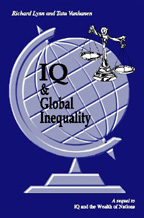Related Research Articles
The Flynn effect is the substantial and long-sustained increase in both fluid and crystallized intelligence test scores that were measured in many parts of the world over the 20th century, named after researcher James Flynn (1934–2020). When intelligence quotient (IQ) tests are initially standardized using a sample of test-takers, by convention the average of the test results is set to 100 and their standard deviation is set to 15 or 16 IQ points. When IQ tests are revised, they are again standardized using a new sample of test-takers, usually born more recently than the first; the average result is set to 100. When the new test subjects take the older tests, in almost every case their average scores are significantly above 100.

An intelligence quotient (IQ) is a total score derived from a set of standardised tests or subtests designed to assess human intelligence. The abbreviation "IQ" was coined by the psychologist William Stern for the German term Intelligenzquotient, his term for a scoring method for intelligence tests at University of Breslau he advocated in a 1912 book.

James Robert Flynn was an American-born New Zealand moral philosopher and intelligence researcher. Originally from Washington, D.C., and educated at the University of Chicago, Flynn emigrated to Dunedin in 1963, where he taught political studies at the University of Otago. He was noted for his publications about the continued year-after-year increase of IQ scores throughout the world, which is now referred to as the Flynn effect. In addition to his academic work, he championed social democratic politics throughout his life.
Discussions of race and intelligence – specifically regarding claims of differences in intelligence along racial lines – have appeared in both popular science and academic research since the modern concept of race was first introduced. With the inception of IQ testing in the early 20th century, differences in average test performance between racial groups were observed, though these differences have fluctuated and in many cases steadily decreased over time. Complicating the issue, modern science has concluded that race is a socially constructed phenomenon rather than a biological reality, and there exist various conflicting definitions of intelligence. In particular, the validity of IQ testing as a metric for human intelligence is disputed. Today, the scientific consensus is that genetics does not explain differences in IQ test performance between groups, and that observed differences are environmental in origin.

The Bell Curve: Intelligence and Class Structure in American Life is a 1994 book by psychologist Richard J. Herrnstein and political scientist Charles Murray, in which the authors argue that human intelligence is substantially influenced by both inherited and environmental factors and that it is a better predictor of many personal outcomes, including financial income, job performance, birth out of wedlock, and involvement in crime than are an individual's parental socioeconomic status. They also argue that those with high intelligence, the "cognitive elite", are becoming separated from those of average and below-average intelligence, and that this separation is a source of social division within the United States.

The Hoover Institution is an American public policy think tank which promotes personal and economic liberty, free enterprise, and limited government. While the institution is formally a unit of Stanford University, it maintains an independent board of overseers and relies on its own income and donations. It is widely described as conservative, although its directors have contested the idea that it is partisan.

IQ and the Wealth of Nations is a 2002 book by psychologist Richard Lynn and political scientist Tatu Vanhanen. The authors argue that differences in national income are correlated with differences in the average national intelligence quotient (IQ). They further argue that differences in average national IQs constitute one important factor, but not the only one, contributing to differences in national wealth and rates of economic growth.

Richard Lynn was a controversial English psychologist and self-described "scientific racist" who advocated for a genetic relationship between race and intelligence. He was the editor-in-chief of Mankind Quarterly, a white supremacist journal. He was a professor emeritus of psychology at Ulster University, but had the title withdrawn by the university in 2018. Lynn was lecturer in psychology at the University of Exeter and professor of psychology at the Economic and Social Research Institute, Dublin, and at the University of Ulster at Coleraine.
Hereditarianism is the doctrine or school of thought that heredity plays a significant role in determining human nature and character traits, such as intelligence and personality. Hereditarians believe in the power of genetics to explain human character traits and solve human social and political problems. Hereditarians adopt the view that an understanding of human evolution can extend the understanding of human nature.
The Minnesota Transracial Adoption Study examined the IQ test scores of 130 black or interracial children adopted by advantaged white families. The aim of the study was to determine the contribution of environmental and genetic factors to the poor performance of black children on IQ tests as compared to white children. The initial study was published in 1976 by Sandra Scarr and Richard A. Weinberg. A follow-up study was published in 1992 by Richard Weinberg, Sandra Scarr and Irwin D. Waldman. Another related study investigating social adjustment in a subsample of the adopted black children was published in 1996. The 1992 follow-up study found that "social environment maintains a dominant role in determining the average IQ level of black and interracial children and that both social and genetic variables contribute to individual variations among them."
Research on the heritability of IQ inquires into the degree of variation in IQ within a population that is due to genetic variation between individuals in that population. There has been significant controversy in the academic community about the heritability of IQ since research on the issue began in the late nineteenth century. Intelligence in the normal range is a polygenic trait, meaning that it is influenced by more than one gene, and in the case of intelligence at least 500 genes. Further, explaining the similarity in IQ of closely related persons requires careful study because environmental factors may be correlated with genetic factors.

IQ and Global Inequality is a 2006 book by psychologist Richard Lynn and political scientist Tatu Vanhanen. IQ and Global Inequality is follow-up to their 2002 book IQ and the Wealth of Nations, an expansion of the argument that international differences in current economic development are due in part to differences in average national intelligence as indicated by national IQ estimates, and a response to critics. The book was published by Washington Summit Publishers, a white nationalist and eugenicist publishing group.

What Is Intelligence?: Beyond the Flynn Effect is a book by psychologist James R. Flynn which outlines his model for an explanation of the eponymous Flynn effect. The book summarizes much of the work of Flynn in this area, as well as that of his colleague William Dickens of the Brookings Institution.
The history of the race and intelligence controversy concerns the historical development of a debate about possible explanations of group differences encountered in the study of race and intelligence. Since the beginning of IQ testing around the time of World War I, there have been observed differences between the average scores of different population groups, and there have been debates over whether this is mainly due to environmental and cultural factors, or mainly due to some as yet undiscovered genetic factor, or whether such a dichotomy between environmental and genetic factors is the appropriate framing of the debate. Today, the scientific consensus is that genetics does not explain differences in IQ test performance between racial groups.
The Eyferth study, conducted by German psychologist Klaus Eyferth, examined the IQs of white and racially-mixed children raised by single mothers in post-World War II West Germany. The mothers of the children studied were white German women, while their fathers were white and black members of the US occupation forces. In contrast to results obtained in many American studies, the average IQs of the children studied were roughly similar across racial groups, making the study an oft-cited piece of evidence in the debate about race and intelligence.
The relationship between nations and IQ is a controversial area of study concerning differences between nations in average intelligence test scores, their possible causes, and their correlation with measures of social well-being and economic prosperity.

William A. "Sandy" Darity Jr. is an American economist and social scientist at Duke University. Darity's research spans economic history, development economics, economic psychology, and the history of economic thought, but most of his research is devoted to group-based inequality, especially with respect to race and ethnicity. His 2005 paper in the Journal of Economics and Finance established Darity as the 'founder of stratification economics.' His varied research interests have also included the trans-Atlantic slave trade, African American reparations and the economics of black reparations, and social and economic policies that affect inequities by race and ethnicity. For the latter, he has been described as "perhaps the country’s leading scholar on the economics of racial inequality."
Alan Manning is a British economist and professor of economics at the London School of Economics.
Garett Jones is an American economist and author. His research pertains to the fields of macroeconomics, monetary policy, IQ in relation to productivity, short-term business cycles, and economic development. He is an associate professor at George Mason University and the BB&T Professor for the Study of Capitalism at the Mercatus Center.
References
- ↑ "William T. Dickens". Name Authority File. Library of Congress . Retrieved 14 June 2017.
- 1 2 3 "William T. Dickens Curriculum Vitae" (PDF). Brookings Institution . Retrieved 14 June 2017.
- ↑ Maclay, Kathleen (16 August 2000). "Economist to help Justice Department analyze mergers, competition". The Berkeleyan. University of California, Berkeley . Retrieved 14 June 2017.
- ↑ Peterson, Jonathan (21 August 1994). "West Coast Economists Forge Axis With D.C." Los Angeles Times . Retrieved 14 June 2017.
- ↑ "Renowned Economics Scholar William T. Dickens Appointed to Northeastern University Faculty". News@Northeastern. Northeastern University. 7 July 2008. Retrieved 14 June 2017.
- ↑ Foreman, Tom (2 August 2013). "7%-plus: The new abnormal". CNN . Retrieved 14 June 2017.
- ↑ O'Brien, Matthew (12 December 2012). "I Can't Stop Looking at These Terrifying Long-Term Unemployment Charts". The Atlantic . Retrieved 14 June 2017.
- 1 2 Morin, Richard (9 August 2006). "Analysis Shows 'IQ Gap' Closing". The Washington Post . Retrieved 14 June 2017.
- ↑ Gellene, Denise (22 June 2007). "Firstborn children found to have higher intelligence". Los Angeles Times . Retrieved 14 June 2017.
- ↑ Johnson, Steven (1 May 2005). "Dome Improvement". Wired . Retrieved 14 June 2017.
- ↑ Dickens, William T.; Flynn, James R. (October 2006). "Black Americans Reduce the Racial IQ Gap". Psychological Science. 17 (10): 913–920. CiteSeerX 10.1.1.186.2540 . doi:10.1111/j.1467-9280.2006.01802.x. PMID 17100793. S2CID 6593169.
- ↑ Viadero, Debra (21 June 2006). "Black-White Gap in IQ Scores Closing, Study Finds". Edweek . Retrieved 14 June 2017.
- ↑ Begley, Sharon (22 April 2001). "Are We Getting Smarter?". Newsweek . 137 (17): 50–51. PMID 11338628 . Retrieved 14 June 2017.
- ↑ Dickens, William; Flynn, James (2001). "Heritability estimates vs. large environmental effects: the IQ paradox resolved". Psychological Review . Retrieved 16 December 2020.